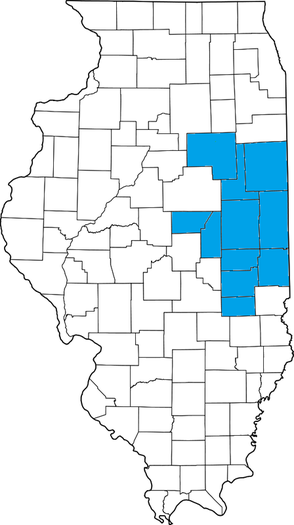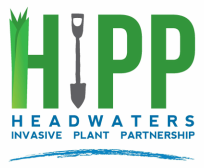About HIPP
.

Headwaters Invasive Plant Partnership (HIPP)
HIPP is a cooperative weed management area (CWMA), a partnership between local, state, and federal agencies, non-profit organizations, private landowners, and university groups in east central Illinois to address the threat of terrestrial and aquatic invasive plants across jurisdictional boundaries. HIPP, while formally established in June 2015, is built upon the efforts of a six year Invasive Plant Task Force established by the East Central Illinois Master Naturalists.
Mission
Our mission is to reduce the impact of invasive plant species in east central Illinois. By sharing limited resources we can improve effectiveness and efficiency across these areas:
Geographic Coverage
HIPP's coverage includes eleven counties in east central Illinois that are home to the headwaters and much of the watersheds of the Embarras, Kaskaskia, Little Vermilion, Mackinaw, Sangamon, and Vermilion Rivers. HIPP will cover Champaign, Coles, Cumberland, DeWitt, Douglas, Edgar, Ford, Iroquois, Livingston, Piatt, and Vermilion counties initially.
Partners in HIPP
HIPP is a cooperative weed management area (CWMA), a partnership between local, state, and federal agencies, non-profit organizations, private landowners, and university groups in east central Illinois to address the threat of terrestrial and aquatic invasive plants across jurisdictional boundaries. HIPP, while formally established in June 2015, is built upon the efforts of a six year Invasive Plant Task Force established by the East Central Illinois Master Naturalists.
Mission
Our mission is to reduce the impact of invasive plant species in east central Illinois. By sharing limited resources we can improve effectiveness and efficiency across these areas:
- Education and Awareness
- Prevention
- Early Detection and Rapid Response
- Control and Management
- Rehabilitation and Restoration
Geographic Coverage
HIPP's coverage includes eleven counties in east central Illinois that are home to the headwaters and much of the watersheds of the Embarras, Kaskaskia, Little Vermilion, Mackinaw, Sangamon, and Vermilion Rivers. HIPP will cover Champaign, Coles, Cumberland, DeWitt, Douglas, Edgar, Ford, Iroquois, Livingston, Piatt, and Vermilion counties initially.
Partners in HIPP
- Allerton Park and Retreat Center
- Champaign County Forest Preserve District
- Champaign County Soil and Water Conservation District
- Champaign Park District
- Coles County Soil and Water Conservation District
- Cumberland County Soil and Water Conservation District
- DeWitt County Soil and Water Conservation District
- Douglas County Soil and Water Conservation District
- East Central Illinois Master Naturalists
- Edgar County Soil and Water Conservation District
- Embarras Volunteer Stewards
- Faith in Place
- Ford County Soil and Water Conservation District
- Friends of Illinois Nature Preserves
- Grand Prairie Friends
- Heartland Pathways (HP)
- Illinois Department of Agriculture
- Illinois Department of Natural Resources
- Illinois Nature Preserves Commission
- Illinois Department of Transportation
- Illinois Tree Farm System
- Iroquois County Soil and Water Conservation District
- Land Conservation Foundation
- Lincoln Heritage Resource Conservation and Development
- Livingston County Soil and Water Conservation District
- Pheasants Forever - Illinois
- Piatt County Soil and Water Conservation District
- United States Department of Agriculture, NRCS Illinois State
- University of Illinois Natural History Survey
- University of Illinois Extension covering Champaign, Ford, Iroquois, and Vermilion Counties
- University of Illinois Extension covering DeWitt, Macon, and Piatt Counties
- Upper Sangamon River Conservancy
- Urbana Park District
- Vermilion County Conservation District
- Vermilion County Soil and Water Conservation District
HIPP Memorandum of Understanding
This document establishes the partners' working relationship.
This document establishes the partners' working relationship.

